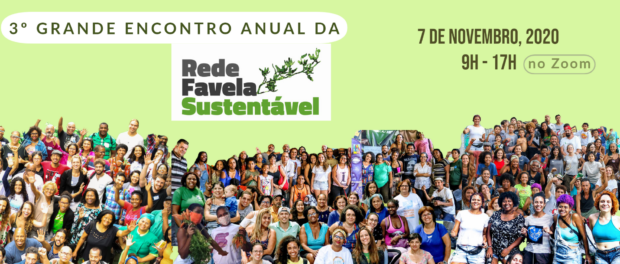
This is the first article in a series covering the events of the 3rd Annual Full-Network Meet-Up of the Sustainable Favela Network, which happened online on November 7, 2020.
The Sustainable Favela Network (SFN) is a project of Catalytic Communities (CatComm)* with the aim of building solidarity networks, increasing visibility, and developing joint activities that support the expansion of community-based initiatives that strengthen environmental sustainability and social resilience in favelas across the Rio de Janeiro Metropolitan Region. The project began with the 2012 film Favela as a Sustainable Model, followed in 2017 with the mapping of sustainability initiatives in favelas across Rio. In 2018, the program organized local exchanges between eight of the most well-established community programs, followed by the 1st Annual Full-Network Meet-Up, launching the SFN formally on November 10, 2018. In 2019, the program organized another round of exchanges—this time open to all SFN members and to members of the public—in five favelas in Rio de Janeiro. The activities carried out in 2019 culminated in the 2nd Annual Full-Network Meet-Up. In 2020, the SFN’s Working Groups continued to meet—online, due to the coronavirus pandemic—carrying out a range of activities such as rounds of support (rondas afetivas), teach-ins, seminars, fundraising campaigns, a commitment letter for political candidates, and a debate with mayoral candidates. To close the year, the Sustainable Favela Network held its 3rd Annual Full-Network Meet-Up, summarized below and in this series, with the aim of bringing the network together, promoting the mutual strengthening of relationships among socio-environmental organizers, evaluating the SFN’s 2020 activities, and making plans for 2021. This is the first installment in a series of articles about the 3rd Annual Full Network Meet-Up, showing how creative engagement during the pandemic allowed for an exchange of knowledge and products: the results of the network’s remote mobilization.
Remembering the Year 2020
On Saturday, November 7, 2020, the Sustainable Favela Network held its 3rd Annual Full-Network Meet-Up, bringing together members of the dynamic network comprised of residents, technical allies, and activists from almost 50 favelas from across Rio de Janeiro, as well as quilombos (formally recognized ancestral lands of descendants of enslaved Africans) and regions on the periphery of the Rio de Janeiro Metropolitan Region. Participants also joined the meeting from other areas in Brazil (São Paulo and Recife) and from abroad, including visitors from the USA (Los Angeles, New York, and Lowell, MA) and Europe (Portugal, England, and Norway). The Meet-Up took place on Zoom from 9am to 5pm, with 127 people taking part, and with 1,232 views as the event was livestreamed on Facebook.
The Meet-Up looked for creative ways to face the difficulty of holding an important community meeting online in the middle of a pandemic. How to foster the same collective spirit felt at this event as we had in previous years, since this time everyone would be meeting at a distance, communicating via screens?
The first activity of the 3rd Annual Meet-Up was a retrospective hour, remembering and commemorating all the SFN’s work in 2020. Theresa Williamson, Executive Director of Catalytic Communities, who moderated the day’s activities, started by showing a retrospective video summarizing the teach-ins carried out by each SFN Working Group in 2020. The video also included the SFN’s debate with Rio de Janeiro’s 2020 mayoral candidates, as well as the SFN’s commitment letter to the sustainable community-led development of the city’s favelas, which was signed by 5 mayoral candidates and 89 city council candidates in the 2020 elections.
The video, produced by cinematographer and SFN member Luiza de Andrade, showed the variety of themes covered by the network’s activities in 2020, ranging from solar energy to food sovereignty, craftsmanship to quilombos, waste pickers to ecological sewage systems, social and environmental activism to political actions.
Watch the 2020 retrospective video, specially prepared for the 3rd Annual Full-Network Meet-Up:
Alongside the video, Theresa Williamson gave a presentation showing the history of the SFN and other activities carried out in 2020: Working Group meetings, seminars, workshops, fundraising campaigns, and more:
Artist and urban designer Natalia Meléndez Fuentes also created a summary of the SFN’s activities in 2020 (we recommend clicking to see it more clearly):
Following this, using an online platform while also inviting network members to take the microphone, Theresa asked participants, “How is the Sustainable Favela Network important to you?” The responses appeared on the screen:

“(S)he who has nothing, has everything to build,” was one of the moving comments by participants. These words were spoken by Nill Santos, a member of the SFN’s Working Group on Gardens and Reforestation, and president of the Association of Assertive Women with Social Commitment (AMAC). Nill also said, “I’m feeling emotional: we activists know how difficult it is to work in a city like Rio. I’m grateful to all you social entrepreneurs who are working to create a better world for our children and grandchildren.”
Watch the Introduction to the 3rd Annual Full-Network Meet-Up of the Sustainable Favela Network here:
This is the first article in a series covering the events of the 3rd Annual Full-Network Meet-Up of the Sustainable Favela Network, which happened online on November 7, 2020.
*The Sustainable Favela Network and RioOnWatch are both projects of Catalytic Communities (CatComm). The Sustainable Favela Network is supported by the Heinrich Böll Foundation Brazil.

